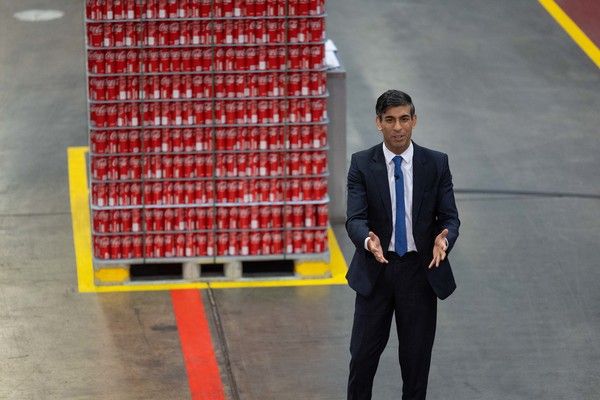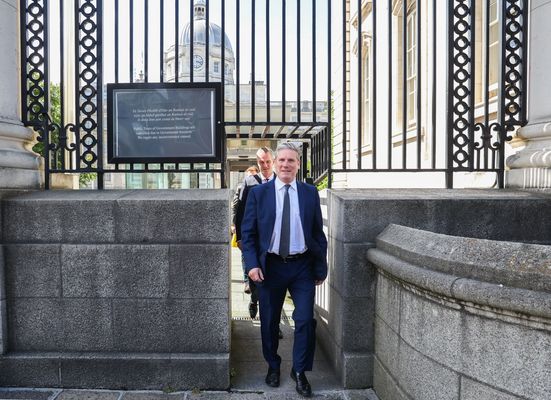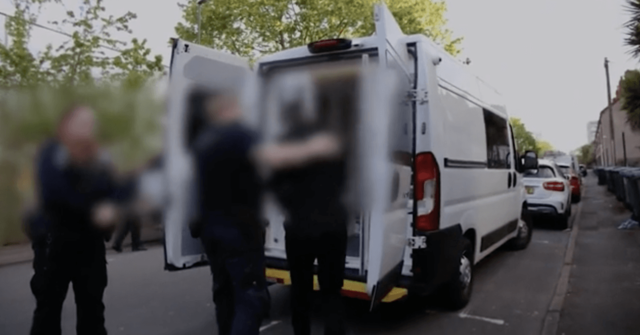ONE minute the British Prime Minister is being praised for agreeing to the Windsor framework; the next he is promoting a bill that means his government will be in breach of international law, including the Refugee Convention and the European Convention on Human Rights (ECHR).
UNHCR, the UN Refugee Agency, is profoundly concerned by the asylum bill introduced by the UK Government to the House of Commons today.
— UNHCR United Kingdom (@UNHCRUK) March 7, 2023
Our statement here: https://t.co/gyn8sAKqVg Tweet 1/2 pic.twitter.com/l1FC8Ctpl2
These are the two faces of Sunak: the pragmatism of a Goldman Sachs’ banker and the hard right jingoism of ‘stop the boats’. He could scarcely conceal his delight at the prospect of new detention camps for asylum seekers, especially as the French government will be paid half a billion to do the dirty work of building them across the English channel.
Critics of the Illegal Immigration Bill say that it will not stop the boats, nor deter people from seeking asylum in England. It will do nothing to improve the sluggish rate of dealing with current asylum claims. Nor will it greatly increase the number of asylum seekers deported to other countries because there is, at present, only an agreement with Rwanda which has very limited capacity. What it will do is condemn asylum seekers “to internment or destitution”.
But ultimately, the Home Office aren't going to be able to remove many people under this bill. Instead, tens of thousands of people will be left in limbo. They won't be able to be removed, but they also won't have their claims heard. They won't be able to work. So what happens?
— Jon Featonby (@jonfeatonby) March 12, 2023
The Bill has implications beyond the English channel. The Committee on the Administration of Justice published a briefing paper last week illustrating how the Bill may impact on people crossing the border from the Republic for shopping or tourism in the North. The briefing states: “this legislation could result in, for example, a Brazilian or American (non-visa) national visiting Ireland, who travels to Northern Ireland for a day trip, without obtaining Electronic Travel Authorisation, being detained indefinitely in Great Britain, without proper recourse to the courts and potentially removed to a third country.”
In the rush to demonise people crossing in small boats, the UK government is rolling out laws which could severely impact the land border. Our latest briefing note details issues which require urgent clarification from @ukhomeoffice
— CAJ (@CAJNi) March 16, 2023
➡️https://t.co/Mz5f369CF4 pic.twitter.com/yRe92J4KEr
It is no surprise that many see the new Bill – since 2015, the sixth piece of legislation seeking to control who enters Britain – as electioneering. Or as migration policy analyst Zoe Gardner puts it, the government is engaged in “performative cruelty”, a deliberate dehumanisation of the 100 million apparently queuing up to invade Britain. “They are coming here,” says the Home Secretary who provided no impact assessment of the Bill.
Such statements from within government undoubtedly fuel far right racism, currently being mobilised around facilities housing migrants, racism which is increasingly manifest in many European countries, including Ireland. It fosters the kind of attitudes expressed by a DUP election candidate and Paisley canvasser who tweeted, “Trailer for sale… only sleeps 39 people”, after 39 Vietnamese were found suffocated in a refrigerated trailer in Essex in 2019, a smuggling operation involving two people from the North.
But is ‘stop the boats’ the vote-winning slogan Sunak thinks it is? The support for Gary Lineker, after his suspension by the BBC for tweeting against Braverman’s Bill and rhetoric, suggests otherwise.
Braverman was unable to provide an assurance that the Bill complies with the ECHR. If it becomes law, it is only a matter of time before the Bill will be judged as in breach of Britain’s obligations under the Convention (which is why deportations to Rwanda have not as yet taken place under the 2022 Nationality and Borders Act). Some Tories, ardent Brexiters amongst them, relish this prospect as they want to ditch the Convention. That this is openly debated is shocking enough, but should Britain withdraw from the ECHR, there would be serious repercussions, not least for the Good Friday Agreement, the Trade and Cooperation Agreement, and the Protocol on Ireland/Northern Ireland.
Talking of which, how long do we have to wait for the DUP to accept the Windsor framework and crawl back to Stormont? Is there a split – sorry, a difference of opinion – within the party on the issue? If the machinations at Westminster are anything to go by, the DUP are not of one mind on everything everywhere. Although East Belfast MP Gavin Robinson claims he was speaking for the party when he described Braverman’s Bill as “cruel and immoral”, he was one of only two DUP MPs who turned up to vote against it. There were six no-shows, including culture warrior Gregory Campbell who earlier demanded that, “the BBC reviews the contract of well-known multimillionaire lefty Lineker—who presents himself as a sports presenter with very scandalous views about Government policy—to decide whether he is a sports presenter or a political pundit”.
The EU has just lowered the amount of permitted arsenic in baby foods. The logic of the fundamentalists is that the North should stick with the old standards to remain aligned with the “UK single market”. As it happens, the British Specialist Nutrition Association, the trade body for baby food manufacturers, has decided to follow the new EU standards, so crisis averted.
While for some, the issue with the Windsor framework is not being able to order plants from England online, for fundamentalists the problem stems from violations of the Act of Union 1800, notably Article 6 which states: “[His] Majesty's subjects of Great Britain and Ireland shall … be on the same footing … in respect of trade”.
In Washington last week, Jeffrey Donaldson claimed that the Windsor Framework does not “adequately remedy the harm done by the Protocol to Article 6 of the Acts of Union and our ability to trade with the rest of the United Kingdom”. He is still seeking comfort from the British government on this and on the ability of 30 MLAs at Stormont to veto any new EU regulations governing the single market in goods.
The fundamentalists argue that the principle enshrined in Article 6 is more important than what might happen in practice when, as is clearly the desire of Johnsonite Brexiters, Britain diverges from EU standards. Already we have a good example of this in the case of arsenic in baby foods. There is arsenic in baby foods because they contain a lot of rice which draws in arsenic from contaminated water, fertilisers and pesticides.
The EU has just lowered the amount of permitted arsenic in baby foods. The logic of the fundamentalists is that the North should stick with the old standards to remain aligned with the “UK single market”. As it happens, the British Specialist Nutrition Association, the trade body for baby food manufacturers, has decided to follow the new EU standards, so crisis averted.
Not so with contaminated, substandard meat which enters the UK because post-Brexit border checks have been delayed four times and are still not in place. But hey, equal access to the UK single market in rubbish meat (and the risk of African Swine Fever) is obviously the priority and the point of principle.
Brexit leads to unsafe meat & African Swine Fever warnings as UK border checks on food stop
— Prof Chris Elliott OBE (@QUBFoodProf) February 14, 2023
White vans arriving from Eastern Europe full of meat being sold in local markets
Food safety & serious animal disease controls been thrown to the wind https://t.co/Z6d7y1T5gE
Earlier this month, the Secretary of State said N. Ireland’s place in the UK was secure and, “we’ll be looking to bring forward amendments to the Northern Ireland Act of 1998 to provide further assurances on that matter”. Note, no assurances about the basis of calling a referendum on unity. Heaton-Harris intended to comfort the DUP with the Statutory Instrument, published on Monday (20 March), which sets out how the “Stormont brake” is to work. Even before this was published, the DUP declared their intention to vote against the government this week. So the fantasy of Act of Union “economic rights” and sovereignty maintains its grip.
Mountains have been moved in a good faith attempt to address concerns with the operation of the Protocol.
— Colin Harvey (@cjhumanrights) March 20, 2023
Beyond belief that our power-sharing institutions remain the collateral casualty.
Of a juvenile fantasy sovereignty myth.







